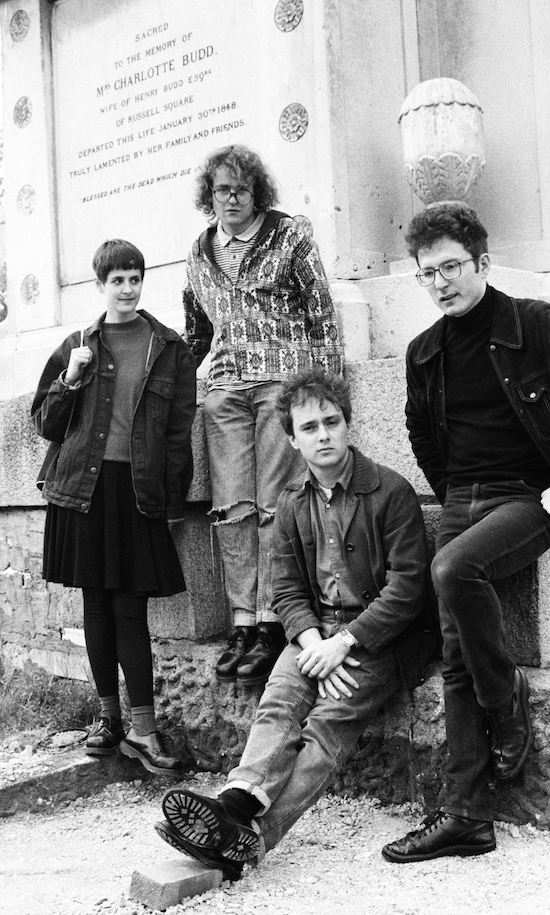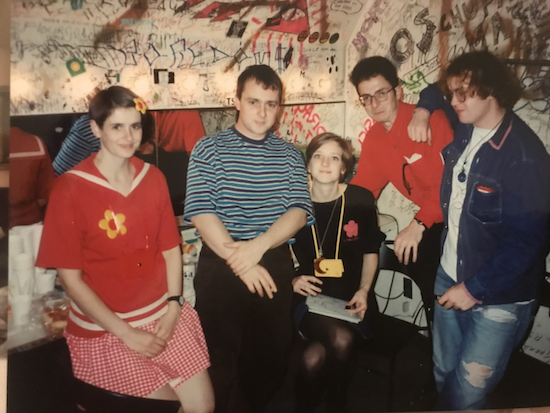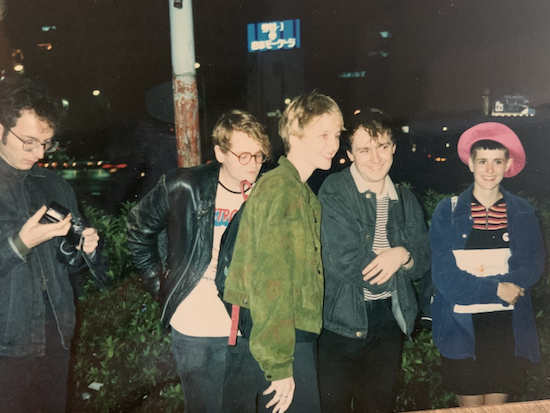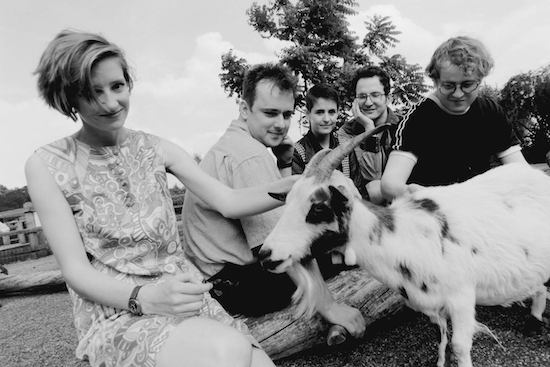Heavenly in the 1990s, photo by Alison Wonderlan
“We avoided Britpop mainly by going to other places,” Heavenly’s singer and guitarist Amelia Fletcher says. “When we went to Japan or America, we quite often felt like ‘Yeah, this is it. We’ve made it, and on our own terms, we haven’t had to sell out.’ And then we’d come back. One particular time we returned from America really fired up and our first gig in Britain was in Gillingham, and literally there was one man and a dog there.”
Her bandmates – Rob Pursey (bass), Peter Momtchiloff (guitar), and Cathy Rogers (keyboards, vocals) – all have a huge sense of humor when it comes to their life as part-time pop stars. Remembering that night in Gillingham causes them to burst out into laughter, as they will do again many times during our conversation. With vinyl re-releases of all four Heavenly albums due out on Pursey and Fletcher’s own Skep Wax label over the course of the next two years, the group will also be performing at Bush Hall in London next May.
These will be their first gigs in 26 years, as the band called it a day after the tragic death of drummer Matthew Fletcher (Amelia’s brother) in 1996, just months before the release of their final album, Operation Heavenly. “It takes a long time to come back,” Pursey explains. “And there’s many reasons for it. The original vinyl is now very expensive, and we saw that there was interest when Damaged Goods put out the singles compilation a few years ago. The biggest impediment has been the emotional element of ‘right, we’re gonna do a gig without Matthew’, which even now still feels a little odd. But during lockdown there wasn’t much future to think about so you’re more likely to go over the past. And I started thinking ‘this was a really good band’. The songs are really good. And it’s an interesting band. We weren’t a political band, but politically and in the history of things it was probably more interesting than we thought at the time!”
So let’s talk about that time. You were on different labels all over the world, as a result of which you were perceived differently in England as opposed to America or Japan.
Rob Pursey: Each label came with a reputation. So if you were on Sarah, in pejorative terms you were twee. It was like having a gig in the library, is what they’d have said. Whereas K and Olympia and that West Coast scene was where riot grrrl was coming into being. It was punk. We were the same band in both contexts, we didn’t change anything, but we were received, reviewed, and listened to differently in both places. The same songs felt very different between those two places, because of the context in which we were doing it. There was also a ceiling on how big we could get because we were doing other things with our lives. We were never trying to be a full-time band but thanks to Matt Haynes and Clare Wadd [of Sarah Records] here and Calvin Johnson and Candice Pedersen [of K Records] in America, and Elefant in Spain and Jetset in Japan, we were able to be something quite substantial in all those places, without needing or trying to be enormous in any one of them. We were very lucky to tap into that network of people who were all doing it for the right reasons. What Calvin called ‘the international pop underground’. It existed and still exists. And lucky us to be part of that because we never thought twice about going full-time and trying to sign with a major label.
AF: Well, I did!
RP: The rest of us made sure to subvert that every chance we got.
AF: Only one person ever really seriously wanted to sign us. He was called Jessie. But we used to practice at my parents’ house and my cat was also called Jessie. She’d be locked outside our practice room and at the end of every song she’d be meowing to be let in. So in everyone’s heads ‘Jessie’ was this meow-y cat. Jessie the A&R man was very nice, but whenever I’d be trying to have a conversation with him, Cathy, Rob, and Matthew would all be going ‘meow! meow!’ in the background. It was infuriating. He signed Pulp instead. Probably the right decision. But to be honest, I think part of the reason we’re still really enthusiastic about music is because we didn’t end up signed to a major label. It went ok for Pulp, that is true. I don’t know if it would’ve gone ok for us. You probably need a real strength of focus and mind to deal with being on a major label. Pulp were quite older than us, they were ready. We weren’t ready.

Heavenly around the time of their 1991 debut album, photo by Marcus Torncrantz
So what was your relationship to Britpop like?
RP: Britpop is where what we would’ve called ‘indie’ went corporate. That was what was fundamentally wrong with it. And the fact that it ended up in Downing Street and in the form of Cool Britannia and was entirely co-opted, it felt like it had gone off down the wrong road. You could pick out individual bands who were really good, but as a whole it was the posturing of indie-ness without having the slightest shred of indie-ness, let alone punk-ness, about it. For me that was what was grotesque about it.
AF: One of the reasons that we didn’t try to ride the Britpop wave is that when we were in Talulah Gosh, we were incredibly hyped. And not really because of anything we did deliberately. When we were barely going, we got full page three of the NME, and very effusive write-ups from people like The Legend. We were made out to be ‘the next big thing’, and we didn’t really know what we were doing! I don’t think people necessarily came to heckle, I think they came to see the next big thing, but then discovered we were definitely not to their taste!
Peter Momtchiloff: Heavenly weren’t successful enough for that. But somehow we managed to engineer some niches around the world for ourselves where sympathetic people of different kinds showed up. It was really nice playing live with Heavenly because we got nice audiences. That wasn’t true with Talulah Gosh. It was different, more rough and tumble.
AF: It’s funny, when we were thinking up a name for the band, we were deliberately trying to find something that would wind up the established music press and the people that loved the quite macho indie-rock that was going on at that time and didn’t like Sarah. We were trying to find a name that was somewhat effeminate, that macho music journalists would find hard to say and find it hard to consider cool. We also thought of Petal, and all sorts of silly things. When we arrived at Heavenly, it was perfect for that. Funnily enough, Heavenly Records chose their name around the same time, but theirs is more a drug-orientated thing. On the plus side of Britpop, it felt like there was exciting stuff happening around us in London. I think the minus side is, as so often, it was still a pretty laddish world. Everyone was getting excited about two all-male bands. There were some decent female Britpop bands but having been through riot grrrl and thinking that things would change, we suddenly were in a world where they didn’t seem to have changed so much.
Did lad culture ever make its way into any Heavenly gigs?
RP: I did on one occasion put my foot on the monitor. On the whole our audience were not laddish, because in this country we often played with other bands on Sarah Records, where laddish behavior was just not a thing. Which is partly what differentiated it from Britpop. There were women in the audience and there were men and they mostly behaved pretty well towards each other. Women danced and men danced. It was just obviously the way it ought to be. So seeing other gigs where the lads were to the front just felt like something was going pretty badly wrong elsewhere.
Cathy Rogers: There’s something about the whole Britpop label, because a lot of what we’re talking about is the baggage that it carried, rather than the actual music. There was some really good music there. But I think something we escaped when we went to America was the whole class thing. Because in a way Blur vs. Oasis was essentially middle class vs. working class. In the UK, we were a bit posh, and we were doing it part-time, whereas in America, we were just sort of English people without that baggage. It was quite liberating. And I think also America, in terms of feminism, was further ahead than the UK. There was a greater diversity of public women who would say they were feminists, more options were available. Whereas the whole ‘ladette’ thing was so limiting and felt backward even at the time. There was a freshness for us in being away from all those narrow perceptions. It felt less claustrophobic being in America than being in the UK.

Heavenly in Japan
Being more of a pop band, how did you get along with the punkier American bands?
CR: They still had good tunes. It is quite hard to understand why there is that extreme cultural difference of the American scene allowing much more kind of heterogeneity in how it perceived what punk was, compared to Britain where you’re either in this tribe or that tribe or the other tribe. I don’t really know why that is. Because in other ways I think there is probably as much tribalism in America as there is here. In terms of how we got on with them, I think that we felt somewhere in between. Not quite the extreme softness and shyness of the Sarah stereotype, but at the same time not as strident and saying the thing as overtly as the Bikini Kills or the Bratmobiles. But we were as happy with one as with the other. I think it felt more exciting to be with those American bands, because it’s quite difficult being with bands who are shy and self-effacing, compared to those who are quite out there. More of a good time is had that way.
AF: On a personal level, they were very friendly to us. We toured a lot with Bratmobile in particular and they became our really good mates. We didn’t know Bikini Kill as well, but they were always super friendly. I just felt that that was a scene that I had always wanted to be part of but didn’t know it existed because it didn’t exist here in Britain. So once I discovered it, I felt very at home. Our music may have changed a little, but it didn’t exactly become like a riot grrrl sound. One particular thing I now find hard to believe is that when we first went to America I did not think of myself as a feminist. I clearly was, but I didn’t like the term. In the UK it had become a term that was used about women much older than me, about the fights that they were having about glass ceilings and childcare – all of which are obviously incredibly important things – but were completely irrelevant to me. No one seemed to care about the things it turned out that riot grrrl cared about – date rape, girls at the front, lots of different levels. I wasn’t aware of feminists in Britain talking about those things. Riot grrrl essentially made a feminism that just was…right. And then having done that I felt I could call myself a feminist, but not before.
I remember reading about the Bikini Kill/Huggy Bear tour. The atmosphere of those gigs seemed fraught with danger.
AF: Both bands usually did it with a degree of humor. And there were lots of people in the audience, including me and Cathy, who were absolutely loving it.
CR: There was a feeling of edginess, and slight danger, that I don’t think many people would have ever felt about us. We never carried a sense of danger or menace. I think they wanted to cultivate that sense because they wanted to say that things are shit and we need a revolution. That feeling of being on the edge of something is quite exciting for an audience, and also for the band to be in that uncertain space.
AF: I do remember seeing them and often it felt like you were at a rally. So there’d be the songs, but the talking and shouting between songs was really quite polemical. Which was great, it was really fun. I’ll tell you something embarrassing though. I was really good friends with Huggy Bear, in fact Matthew was in Huggy Bear early on. They practiced at my parents’ house. I think their very first gig which was at The Jericho Tavern in Oxford supporting Heavenly. I hadn’t seen them for a while and at soundcheck Niki Eliot was really hollering. So I went up to her afterwards and said ‘yeah, the monitors in here aren’t very good, but you don’t have to holler, just sing at your normal level, it’ll be alright’, without realizing that this was their thing. I felt really embarrassed!

Heavenly in Japan
Thinking back on it all now, what were the highlights?
CR: For me it was the first few times we went to America and discovered all these brilliant bands, got to hang out with them, go on tour with them, and sleep on their floors. All of that felt just incredibly exciting, like having our eyes opened to this whole other world. I’m sure it was accentuated by the fact that we’d come from a place where we were hated by the press, and then suddenly there was somewhere where we fit in. We felt we could swim on that tide and it felt great.
RP: My highlights were going to some of the unlikely places in Britain. We made a point of trying to play in towns where you normally wouldn’t get gigs – Yeovil, Scunthorpe, we even went to Northern Ireland, which was quite a big deal in those days before the peace agreement. Some young kid just wrote us a letter asking if we’d like to come play in Derry. That never would’ve happened if we were on a major label. It would be some agent talking to some other agent. I’m very glad we avoided all that.
AF: In Talulah Gosh, just by doing what we did, we did get a lot of notoriety. And that was kind of ‘oh, that’s how music is meant to work’. But in Heavenly we continued and just made music as good as we feasibly could. We played loads, we did everything right, but we never ever played the proper corporate game that we were supposed to (laughs). I think that’s what happened in Britpop. All the other bands who were kind of similar to us went ‘actually, we could be properly famous if we do play the game’. And they all did, and we still didn’t (laughs). But actually we did pretty well in the context. I have retained naivety against all factual evidence, but I’m ok about that.
Another thing we should mention, on the Britpop front, is that the final album is the one that reflected most that we were listening to Britpop. I don’t think it’s a Britpop album but you can hear the influences on it. And the influence of riot grrrl. It’s a mix of a lot of things. And we will never know if that would’ve been the breakthrough album because my brother died before it even came out. We had tours ready to go, we were about to tour with Bratmobile that summer, we’d signed to Beggars Banquet, which was quite a big indie. For the first time we were possibly in the best place to actually be successful. The album’s well recorded, it’s full of pop hits. I think it could’ve been something but obviously we never did anything with it. We never dreamed of trying to carry on without Matthew. So that was the end of Heavenly. It’s a real pity. One big benefit for me of re-releasing these albums would be if people paid a bit more attention to that final album because I really, really love it.
RP: I think it’s my favourite one as well. It’s got the best songs, and we played well on it.
AF: It’s an interesting sounding record. Even though I say you can hear the influence of Britpop, it doesn’t really sound like anything else. There’s a mix of songs on it, it doesn’t even sound the same as itself. Certainly at the time I felt it was the album we’d been warming up to making, that this was finally our best album. I understand why people really love some of the earlier stuff, there’s a great naivety and warmth to it, but in terms of songwriting and recording and becoming the band we wanted to be, that really was the album that did it.
The Heavenly Vs. Satan reissue is out now on Skep Wax, to be followed by Le Jardin De Heavenly in early summer 2023, and the final two records in 2024



